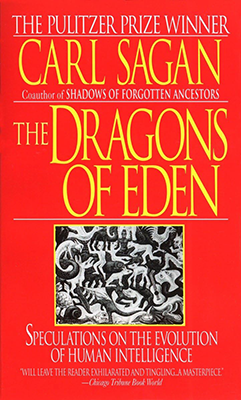The Dragons Of Eden
“The Dragons of Eden: Speculations on the Evolution of Human Intelligence” is a book written by Carl Sagan, first published in 1977. Here’s a summary of its key themes and ideas:
Exploration of Human Brain Evolution: The central theme of the book is the evolution of human intelligence, focusing on how the human brain developed from its primitive origins. Sagan explores the evolutionary history of the brain, from its reptilian ancestors to its complex structure in humans.
Triune Brain Hypothesis: Sagan introduces and discusses the “triune brain” hypothesis proposed by neuroscientist Paul MacLean. According to this hypothesis, the human brain can be divided into three distinct evolutionary layers: the reptilian complex (responsible for basic survival instincts), the limbic system (associated with emotions and behavior), and the neocortex (responsible for higher cognitive functions).
Comparative Neurology: Sagan compares the human brain with those of other animals, highlighting similarities and differences in brain structure and function. He discusses how evolutionary pressures shaped the development of intelligence in different species.
Biological and Cultural Evolution: The book explores the interaction between biological evolution (which shaped the brain) and cultural evolution (which influences human behavior and intelligence through learning and social interactions).
Implications for Human Behavior: Sagan speculates on how understanding the evolutionary origins of human intelligence can shed light on various aspects of human behavior, such as creativity, language, and consciousness. He discusses the implications of these insights for understanding human nature and society.
Interdisciplinary Approach: “The Dragons of Eden” combines insights from neuroscience, evolutionary biology, anthropology, and psychology to present a comprehensive exploration of human intelligence and its origins.
Accessible Style: Sagan writes in a clear and engaging style, making complex scientific concepts accessible to a general audience. He includes illustrations and diagrams to help readers visualize key ideas.
Overall, “The Dragons of Eden” is a thought-provoking exploration of the evolution of human intelligence, blending scientific rigor with imaginative speculation. It remains a classic work in popular science literature, offering readers a deeper understanding of what makes human intelligence unique and how it has evolved over millions of years.

